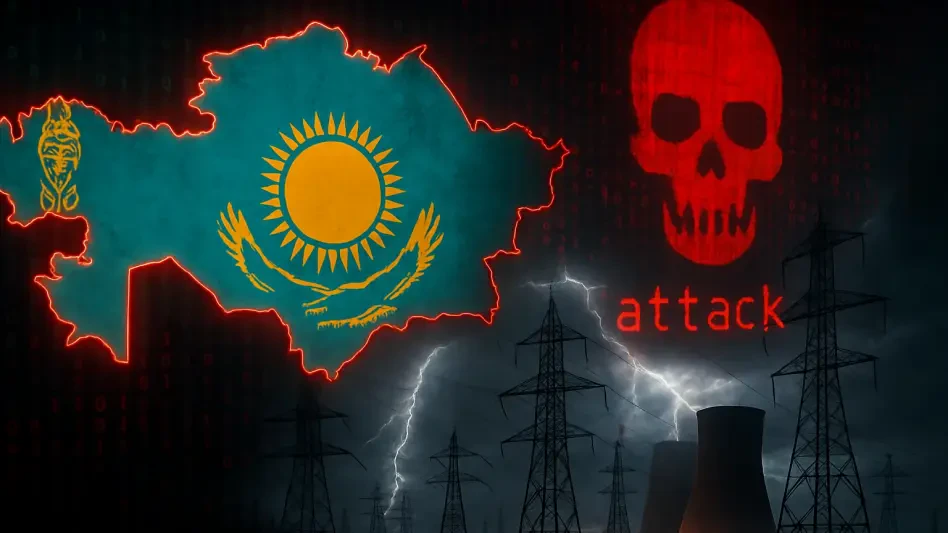What happens when a nation’s energy lifeline is just one click away from chaos? In Kazakhstan, a silent cyber predator known as Noisy Bear has emerged, striking at the heart of the country’s energy sector with chilling precision, and since early this year, this advanced persistent threat (APT) group has been orchestrating a stealthy campaign against KazMunaiGas, the state-owned oil and gas giant, raising alarms about the vulnerability of critical infrastructure. This feature dives into the shadowy operations of Noisy Bear, unraveling their motives, methods, and the broader implications for global energy security in a region already fraught with geopolitical tension.
The Stakes in Central Asia’s Energy Hub
Kazakhstan stands as a linchpin in global energy markets, with vast oil and gas reserves powering economies far beyond its borders. KazMunaiGas isn’t merely a corporation; it’s a national asset, controlling a significant share of production and exports that influence international supply chains. The importance of this sector cannot be overstated—disruption here could ripple through markets, impacting everything from fuel prices to regional stability. Noisy Bear’s focus on this target underscores a calculated intent to exploit a critical vulnerability, one that could yield economic or strategic gains in a geopolitically sensitive area.
The urgency of this threat is amplified by staggering industry data. A recent report highlights a 935.3% surge in ransomware attacks on the oil and gas sector, pointing to an escalating battle in cyberspace. Kazakhstan’s energy infrastructure, already navigating outdated systems and increasing automation, faces heightened risks from APT groups like Noisy Bear. This situation demands attention, as the consequences of a successful breach could extend well beyond digital damage, potentially destabilizing an entire region’s economic foundation.
Unraveling Noisy Bear’s Sinister Playbook
Noisy Bear’s approach to infiltrating KazMunaiGas reveals a blend of cunning deception and technical mastery. Their primary weapon is spear-phishing, where emails masquerade as internal memos from trusted departments like IT or HR, tricking employees into opening malicious attachments. These messages, often crafted with urgent subject lines, exploit human trust, delivering payloads hidden in seemingly harmless files that initiate devastating infection chains.
Beyond basic trickery, the group demonstrates cultural finesse by tailoring their lures to the local context. Using both Russian and Kazakh languages, alongside authentic-looking KazMunaiGas branding, their communications blend seamlessly into the daily workflow of unsuspecting staff. This level of customization suggests deep reconnaissance or insider knowledge, making their attacks harder to detect and far more effective in bypassing initial defenses.
Technically, Noisy Bear operates with alarming sophistication, employing PowerShell scripts and tools like Metasploit to maintain control over compromised systems. Their use of sanctioned web-hosting services to store malicious content further obscures their tracks, complicating efforts to trace or block their activities. Such tactics hint at a broader agenda—possibly tied to espionage or sabotage—raising questions about who stands to gain from undermining Kazakhstan’s energy stability.
Voices from the Cybersecurity Frontline
Experts in the field are sounding the alarm over Noisy Bear’s evolving strategies. A leading cybersecurity analyst notes, “This group’s reliance on social engineering to exploit human error marks a dangerous shift in how APTs target critical infrastructure.” This observation reflects a growing consensus that technical defenses alone are insufficient when attackers prey on psychological vulnerabilities, a tactic proving devastatingly effective in the energy sector.
Patterns emerging from this campaign also draw comparisons to other known threats. Researchers point to similarities with Russian-linked APTs, suggesting a shared playbook of multi-stage attacks and long-term infiltration goals. One specialist remarked, “The linguistic and behavioral clues align with historical operations by groups targeting Central Asian assets, often for geopolitical leverage.” These insights paint a picture of a coordinated effort, potentially driven by motives beyond mere financial gain.
The broader trend of escalating cyber threats to oil and gas infrastructure adds weight to these concerns. With automation expanding the attack surface across pipelines and rigs, and legacy systems lagging in security updates, the industry remains a prime target. Noisy Bear’s campaign serves as a stark reminder of the urgent need to address both human and technological weak points in safeguarding vital resources.
Why Kazakhstan’s Energy Sector Draws Fire
The allure of Kazakhstan’s energy sector to cyber adversaries stems from its strategic significance. Positioned at the crossroads of Europe and Asia, the country plays a pivotal role in energy transit routes, making it a focal point for nations and actors vying for influence. KazMunaiGas, as the backbone of this system, represents not just economic value but also a gateway to disrupting regional power dynamics.
Geopolitical undercurrents further intensify this vulnerability. Central Asia’s complex relationships with neighboring powers create fertile ground for cyber operations that could serve as tools of economic coercion or intelligence gathering. Noisy Bear’s activities, with potential ties to larger state-aligned agendas, highlight how energy infrastructure often becomes a proxy for broader conflicts in the digital realm.
Compounding these risks is the sector’s structural exposure. Many energy firms, including those in Kazakhstan, grapple with outdated cybersecurity measures while adopting digital technologies at a rapid pace. This mismatch creates openings that sophisticated groups exploit with ease, turning operational systems into battlegrounds where the stakes are nothing less than national security.
Building Defenses Against a Silent Enemy
Countering a threat as elusive as Noisy Bear demands a multi-layered approach tailored to the unique challenges of Kazakhstan’s energy landscape. Strengthening email security through advanced filtering and authentication protocols stands as a critical first step, aimed at intercepting spear-phishing attempts before they reach vulnerable employees. Such measures could drastically reduce the initial points of entry for attackers.
Equally important is fostering a culture of awareness within organizations like KazMunaiGas. Regular training programs that teach staff to spot suspicious communications—especially those urging immediate action or containing unexpected attachments—can transform human error from a liability into a line of defense. Empowering employees to question and verify sources is a practical shield against deception.
Modernizing infrastructure and enhancing regional cooperation also play vital roles. Updating legacy systems with real-time threat detection tools can thwart sophisticated payloads, while partnerships with international cybersecurity bodies offer access to shared intelligence on emerging threats. These collaborative efforts are essential to anticipate and neutralize attacks driven by complex geopolitical motives, ensuring that Kazakhstan’s energy future remains secure.
Reflecting on a Cyber Siege
Looking back, the emergence of Noisy Bear as a formidable adversary in Kazakhstan’s energy sector served as a wake-up call for many. Their calculated strikes on KazMunaiGas exposed deep vulnerabilities, not just in technology but in the human elements of cybersecurity. Each meticulously crafted email and cleverly disguised payload revealed how even the most critical infrastructure could falter under the weight of unseen threats.
The lessons drawn from this campaign pointed toward a clear path forward. Industry leaders and policymakers recognized the need to invest in robust digital fortifications, from cutting-edge software to comprehensive training initiatives. Partnerships across borders gained traction as a means to outpace adversaries who thrived in the shadows of fragmented defenses.
As the dust settled, the focus shifted to proactive resilience. The energy sector, once a target of opportunity, began to emerge as a testing ground for innovative solutions—be it through AI-driven threat detection or global cyber alliances. Kazakhstan’s experience with Noisy Bear underscored that survival in this digital age required not just reaction, but anticipation, ensuring that the next silent enemy would face a far tougher battle.








